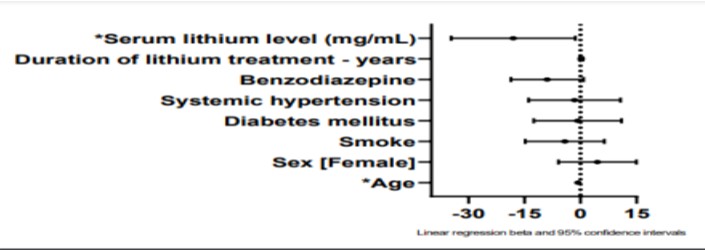


Journal of Pharmaceutical Research
Year: 2024, Volume: 23, Issue: 1, Pages: 49-54
Original Article
Santiago Fernandes1,*, Thiago Cerqueira Silva1,2, Caroline Dalallana1,2, Antônio Raimundo Pinto2, Carla Daltro3, Ângela Miranda Scippa4
1Mood and Anxiety Disorders Program (CETHA), Universidade Federal da Bahia, Salvador, Bahia, Brazil
2Faculdade de Medicina da Bahia, Universidade Federal da Bahia, Salvador, Bahia, Brazil
3Post-graduate Program in Medicine and Health (PPgMS), Universidade Federal da Bahia, Salvador, Bahia, Brazil
4Neuroscience and Mental Health Department (DNCSM), Universidade Federal da Bahia, Salvador, Bahia, Brazil
*Corresponding author email: [email protected]
Bipolar disorder is a chronic disease that represents a significant problem to the affected individual. To date, the mainstay treatment for bipolar disorder consists in mood stabilizers, mainly lithium, which have been linked to acute and chronic kidney injury. To investigate the association between Estimated Glomerular Filtration Rate (eGFR) and sociodemographic and clinical characteristics in a group of patients with bipolar disorder (BD) undergoing lithium treatment, with or without concomitant use of other psychopharmaceuticals. In this cross-sectional study data was collected using the instruments: 1 – Clinical and sociodemographic data questionnaire, developed by the Brazilian Consortium for Bipolar Disorder Research; 2 – Structured Clinical Interview for the DSM-IV Axis I Disorders; 3 – Hamilton’s Rating Scale for Depression, to evaluate depressive symptoms and 4 – Young’s Rating Scale for Mania to evaluate mania symptoms. Renal function was calculated through the CKD/EPI formula for eGFR. 95 patients were included in the final analysis. 26 (27.4%) patients presented reduction in eGFR, 21 (22,1%) with eGFR between 60 to 89 and 5 (5,2%) below 60. Higher serum lithium levels and age were associated with such reduction (β = -18.06 [95% CI: -34.70 to -1.42]); (β = -0.72 (95% CI: -1.10 to -0.33)), respectively. Although lithium is considered the “gold standard” in the treatment of BD, its toxicity and tolerability profile in relation to renal function still needs to be better understood. The results of this study reinforce the idea that periodic control of lithium levels is essential for preserving renal function. Long-term longitudinal studies are needed to assess the relationship between renal function and lithium therapy in BD patients.
Keywords
Lithium, Bipolar Disorder, Kidney, Renal Insufficiency
© 2024 Published by Krupanidhi College of Pharmacy. This is an open-access article under the CC BY-NC-ND license (https://creativecommons.org/licenses/by-nc-nd/4.0/)
Subscribe now for latest articles and news.